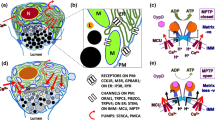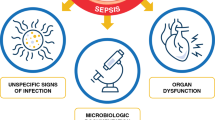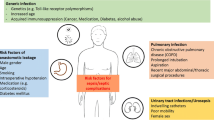Abstract
Necrotizing enterocolitis is the most common gastrointestinal emergency of the neonate, affecting 5–10% of infants, yet the pathogenesis remains unclear. Widely accepted risk factors include prematurity, enteral feeds, bacterial colonization and mucosal injury. How these or other yet identified factors come together to create the classic clinical and pathologic features is the subject of much research. The activation of the cytokine cascade, in part by bacterial ligands, appears to play a key role in mucosal injury. Two mediators that may also contribute are platelet activating factor and intestinal toll-like receptors. Short chain fatty acids, the products of bacterial fermentation of carbohydrates, have been thought to cause mucosal injury. Overgrowth of pathogenic bacteria in the face of a decreased commensal population may play a key role. A current focus of clinical research involves probiotics, enterally fed forms of commsenal bacteria. This may set the stage for a healthier intestinal ecosystem and possibly, decreased risk of NEC.
Similar content being viewed by others
References
Stoll BJ. Epidemiology of necrotizing enterocolitis. Clin Perinatol 1994; 21: 205–218.
Lemons J, Bauer C, Oh W et al. Very low birth weight outcomes of the National Institute of Child Health and Human Development Neonatal Research Network, January 1995 through December 1996. Pediatrics 2001; 107: 1.
Santulli TV, Schullinger JN, Heird WC et al. Acute necrotizing enterocolitis in infancy: a review of 64 cases. Pediatrics 1975; 55: 376–387.
Neu J, Chen M, Bejerle E. Intestinal innate immunity: how does it relate to the pathogenesis of necrotizing enterocolitis. Semin Pediatr Surg 2005; 14(3): 137–144.
Barlow B, Santulli TV, Heird WC. An experimental study of acute neonatal enterocolitis-the importance of breast milk. J Pediatr Surg 1974; 9: 587–595.
Kennedy KA, Tyson JE, Chamnanvanikij S. Rapid versus slow rate of advancement of feedings for promoting growth and preventing necrotizing enterocolitis in parenterally fed low-birth-weight infants. Cochrane Database Syst Rev 2000; (2): CD001241.
Gewolb I, Schwalbe R, Taciak V et al. Stool microflora in extremely low birthweight infants. Arch Dis Child Fetal Neonatal Ed. 1999; 80: 167–173.
Nowicki PT. Ischemia and necrotizing enterocolitis: where, when and how. Semin Pediatr Surg 2005; 14(3): 152–158.
Edelson M, Bagwell C, Rozycki H. Circulating pro-and counterinflammatory cytokine levels and severity in necrotizing enterocolitis. Pediatrics 1999; 103: 766–771.
Caplan MS, Simon D, Jilling T. The role of PAF, TLR, and the inflammatory response in neonatal necrotizing enterocolitis. Semin Pediatr Surg 2005; 14(3): 145–51.
Hsueh W, Caplan MS, Qu XW et al. Neonatal necrotizing enterocolitis: clinical considerations and pathogenic concepts. Pediatr Dev Pathol 2003; 6(1): 6–23.
Rakoff-Nahoum, Paglino J, Eslami-Varzaneh F et al. Recognition of commensal microflora by toll-like receptors is required for intestinal homeostasis. Cell 2004; 118: 229–241.
Lin J. Too much short chain fatty acids cause neonatal necrotizing enterocolitis. Medical Hypotheses 2004; 62: 291–293.
Lin J, Nafday S, Chauvin S et al. Variable effects of short chain fatty acids and lactic acid in inducing intestinal mucosal injury in newborn rats. Journal of Pediatric Gastroenterology and Nutrition 2002; 35: 545–550.
Nafday S, Chen W, Luying P et al. Short-chain fatty acids induce colonic mucosal injury in rats with various postnatal ages. Pediatr Res 2005; 57: 201–204.
Sangild Per, Siggers R, Schmidt M et al. Diet and colonization-dependent intestinal dysfunction predisposes to necrotizing enterocolitis in preterm pigs. Gastroenterology 2006; 130: 1776–1792.
Caplan MS, Miller-Catchpole R, Kaup S et al. Bifidobacterial supplementation reduces the incidence of necrotizing enterocolitis in a neonatal rat model. Gastroenterology 1999; 117: 577–583.
Bin-Nun A, Bromiker R, Wilschanski M et al. Oral probiotics prevent necrotizing enterocolitis in very low birth weight neonates. J Pediatr 2005; 147(2): 192–196.
Lin HC, Su BH, Chen AC et al. Oral probiotics reduce the incidence and severity of necrotizing enterocolitis in very low birth weight infants. Pediatrics 2005; 115(1): 1–4.
Dani C, Biadaioli R, Bertini G et al. Probiotics feeding in prevention of urinary tract infection, bacterial sepsis and necrotizing enterocolitis in preterm infants. Biol of the Neonate 2002; 82: 103–108.
Author information
Authors and Affiliations
Corresponding author
Rights and permissions
About this article
Cite this article
Gibbs, K., Lin, J. & Holzman, I.R. Necrotising enterocolitis: The state of the science. Indian J Pediatr 74, 67–72 (2007). https://doi.org/10.1007/s12098-007-0031-0
Published:
Issue Date:
DOI: https://doi.org/10.1007/s12098-007-0031-0




